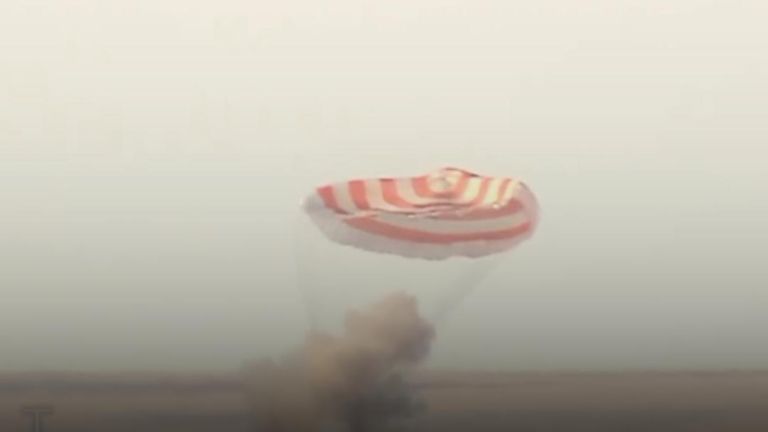[ad_1]
A tutorial-led examine of astronauts has revealed the devastating affect area journey has on the human skeleton.
The analysis confirmed astronauts suffered “vital” bone loss throughout six-month area flights – equal to round twenty years on Earth.
Solely about half the bone loss was recovered a 12 months after returning – elevating considerations about future missions to Mars and the Moon.
Longer area missions led to elevated bone loss and a decreased chance of restoration.
The bone loss happens as a result of a scarcity of gravity in area, the place sometimes weight-bearing bones on Earth are weightless.
The examine was carried out on 17 astronauts – 14 males and three ladies with a median age of 47 – who flew aboard the International Space Station (ISS) previously seven years.
The crew hailed from US area company NASA, the Canadian and European House Businesses, and the Japanese Aerospace Exploration Company.
They labored with a analysis crew led by College of Calgary professor, Leigh Gabel, for a 12 months after returning to Earth.
9 crew members skilled everlasting bone mineral density loss after spending between 4 and 7 months on area missions.
“Astronauts skilled vital bone loss throughout six-month spaceflights – loss that we might count on to see in older adults over twenty years on Earth, and so they solely recovered about half of that loss after one 12 months again on Earth,” Professor Gabel stated of the analysis, revealed in journal Scientific Stories.
“We all know that astronauts lose bone on long-duration spaceflight.
“What’s novel about this examine is that we adopted astronauts for one 12 months after their area journey to know if and the way bone recovers.”
House companies should enhance countermeasures, comparable to train and diet, in a bid to stop bone loss, Professor Gabel warned.
In-flight train together with resistance coaching on the ISS proved essential for stopping bone and muscle loss, the examine discovered.
Astronauts who accomplished extra deadlift weights in comparison with their regular train routine on Earth had been extra more likely to get well bone after a mission.
The astronauts misplaced a median of two.1% decreased density in decrease leg bone, the tibia and 1.3% decreased bone energy.
“Throughout spaceflight, high-quality bone constructions skinny, and ultimately among the bone rods disconnect from each other,” Professor Gabel stated.
“As soon as the astronaut comes again to Earth, the remaining bone connections can thicken and strengthen, however the ones that disconnected in area cannot be rebuilt, so the astronaut’s general bone construction completely adjustments.”
The analysis additionally discovered the cardiovascular system can also be affected by area journey.
“With out gravity pulling blood in direction of our toes, astronauts expertise a fluid shift that causes extra blood to pool within the higher physique,” Professor Gabel stated. “This will have an effect on the cardiovascular system and imaginative and prescient.”
Learn extra:
NASA assembles team of scientists to study UFOs despite facing ‘reputational risk’
‘Solar hedgehog’ among ‘breathtaking’ images released by European Space Agency
Radiation can also be a priority, with astronauts dealing with higher publicity to the solar and an elevated most cancers danger the additional they journey from Earth.
Professor Gabel added: “There’s a lot we nonetheless have no idea concerning how microgravity impacts human well being, notably on area missions longer than six months, and on the long-term well being penalties.
“We actually hope that bone loss ultimately plateaus on longer missions, that individuals will cease dropping bone, however we do not know.”
[ad_2]
Source link




Recent Comments